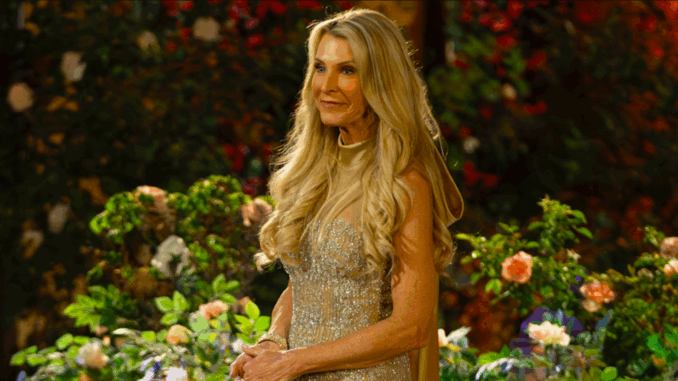
While Gerry Turner may have been the face of The Golden Bachelor, it was the women of the show who truly gave the series its soul. With their grace, depth, humor, and resilience, these contestants redefined what it means to seek love on national television—and in doing so, they captivated an entire generation of viewers who had long felt left out of the conversation.
This was not just another reality TV cast. These were women with decades of life behind them, and still, the courage to believe that their most meaningful love story might still lie ahead.
Redefining Beauty and Strength in Every Frame
In a franchise historically dominated by 20-somethings in cocktail dresses, the women of The Golden Bachelor brought something entirely different to the screen: authenticity.
Faith Martin, with her silver-streaked hair, radiant smile, and acoustic guitar, became an early fan favorite. A teacher, singer, and proud mother, Faith embodied vulnerability and optimism. Her connection with Gerry was deep and soulful, culminating in a breathtaking helicopter ride that symbolized her willingness to take emotional leaps later in life.
Theresa Nist, who eventually won Gerry’s heart, carried a quiet strength rooted in her past. A financial services professional and grandmother, she spoke openly about the loss of her husband and the ache of navigating life alone. Yet what stood out was her openness to love again—and the way she did so with dignity and grace.
Then there was Leslie Fhima, a 64-year-old fitness instructor with a fierce spirit and electric presence. With a background as a dancer and deep emotional layers, Leslie reminded viewers that boldness doesn’t fade with age. She was unapologetically herself, and her heartbreak in the finale was one of the season’s most poignant moments.
Each woman, regardless of screen time, brought something unforgettable: April’s quirky charm, Susan’s warmth, Joan’s poetic elegance, Nancy’s calm resilience. Together, they painted a portrait of womanhood that was expansive, vibrant, and long overdue in prime time.
Sisterhood Over Rivalry
:max_bytes(150000):strip_icc():focal(999x0:1001x2)/golden-bachelor-106-110223-1-447be8f5f26546818610b382868029a9.jpg)
In most reality dating shows, competition is the fuel. But in The Golden Bachelor, what emerged instead was sisterhood.
These women weren’t trying to outdo one another. They shared grief stories over morning coffee. They comforted each other after rose ceremonies. They exchanged stories of children, spouses, and personal loss. The depth of their mutual respect became one of the show’s defining features—and one of its greatest successes.
It became clear that these contestants weren’t just seeking love from Gerry. They were also reclaiming connection, companionship, and community with women who had walked similar roads.
This spirit of solidarity resonated powerfully with audiences, especially older women who recognized that while romantic love is important, the friendships that sustain us in later life are equally vital.
Life After the Mansion
Even after the final rose, the women of The Golden Bachelor continued to make waves. Many of them became active on social media, where fans flocked to their accounts for updates, wisdom, and inspiration. Some have hinted at writing books, launching podcasts, or even starting businesses focused on aging, love, and personal empowerment.
Joan Vassos, who left the show early to care for her daughter, received an outpouring of support—and later, became the historic choice to lead The Golden Bachelorette. Her story symbolized so much of what the show represented: family, sacrifice, and the hope for a second act.
Others, like Leslie and Faith, have hinted at staying open to future opportunities—whether on-screen or off. But what’s most notable is how these women were never reduced to their romantic arcs. They emerged from the show as individual figures, each with her own story still unfolding.
A Blueprint for the Future of Reality TV
By embracing the complexity and beauty of aging women, The Golden Bachelor offered a radical redefinition of what it means to be desirable, lovable, and relevant. These contestants weren’t “older women” as a gimmick—they were women, full stop. And America fell in love with them not in spite of their age, but because of everything their age brought with it: wisdom, wit, and wild hope.
Reality TV, often criticized for its superficiality, suddenly became a space of authenticity.
And viewers responded in kind.
From major media outlets to local viewing parties, the women of The Golden Bachelor sparked conversations about aging, companionship, self-worth, and what it means to be visible. They proved that love stories at 60, 70, or even 80 can be just as gripping, heartbreaking, and beautiful as any at 25.
Conclusion: The Legacy of the Golden Women
In a genre where youth has long been currency, the women of The Golden Bachelor broke the rules simply by being themselves. They showed up, told the truth, and let the world see their joy and pain without apology.
They didn’t just change the narrative—they expanded it.
Thanks to them, television feels a little more inclusive. A little more honest. And a whole lot more golden.
